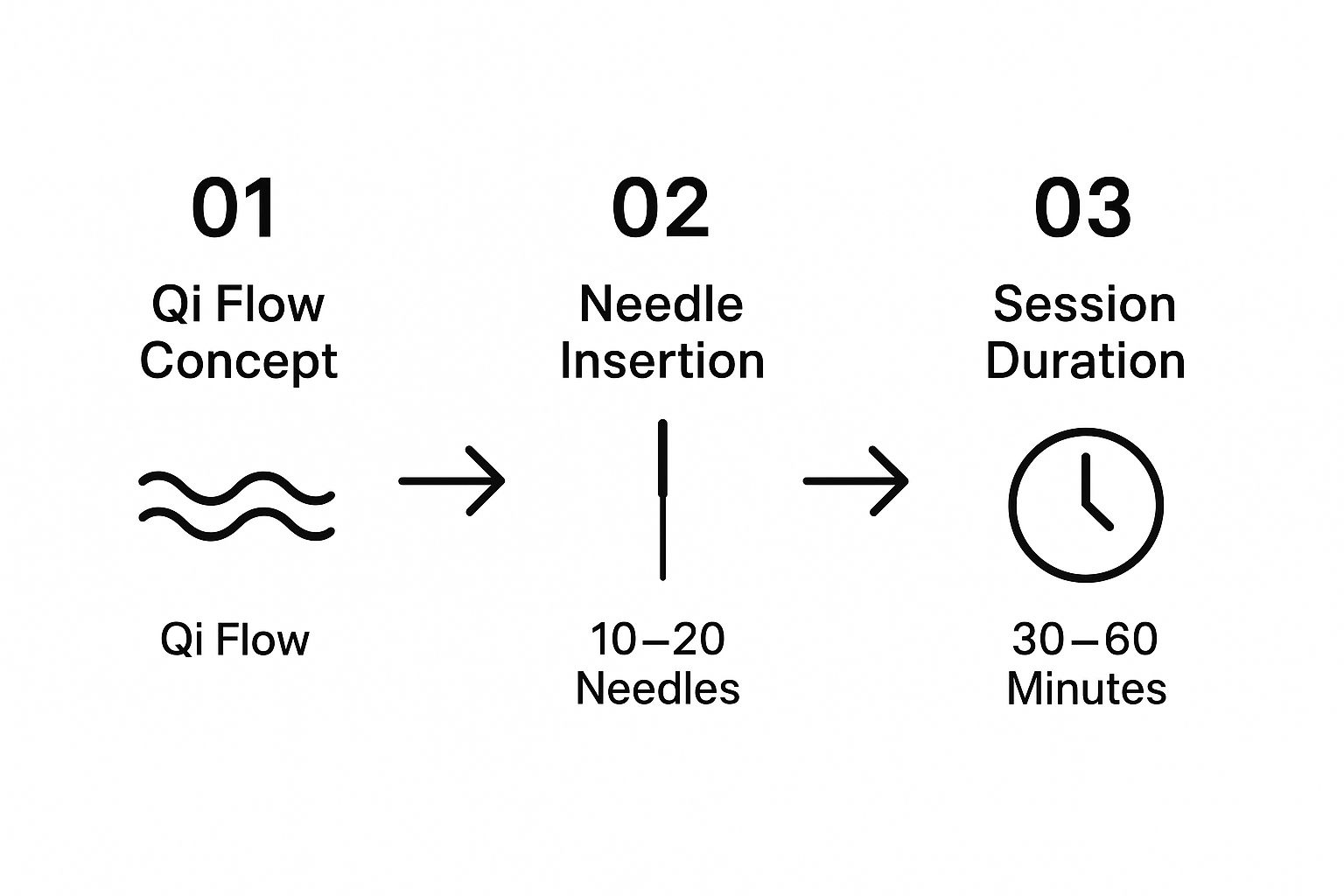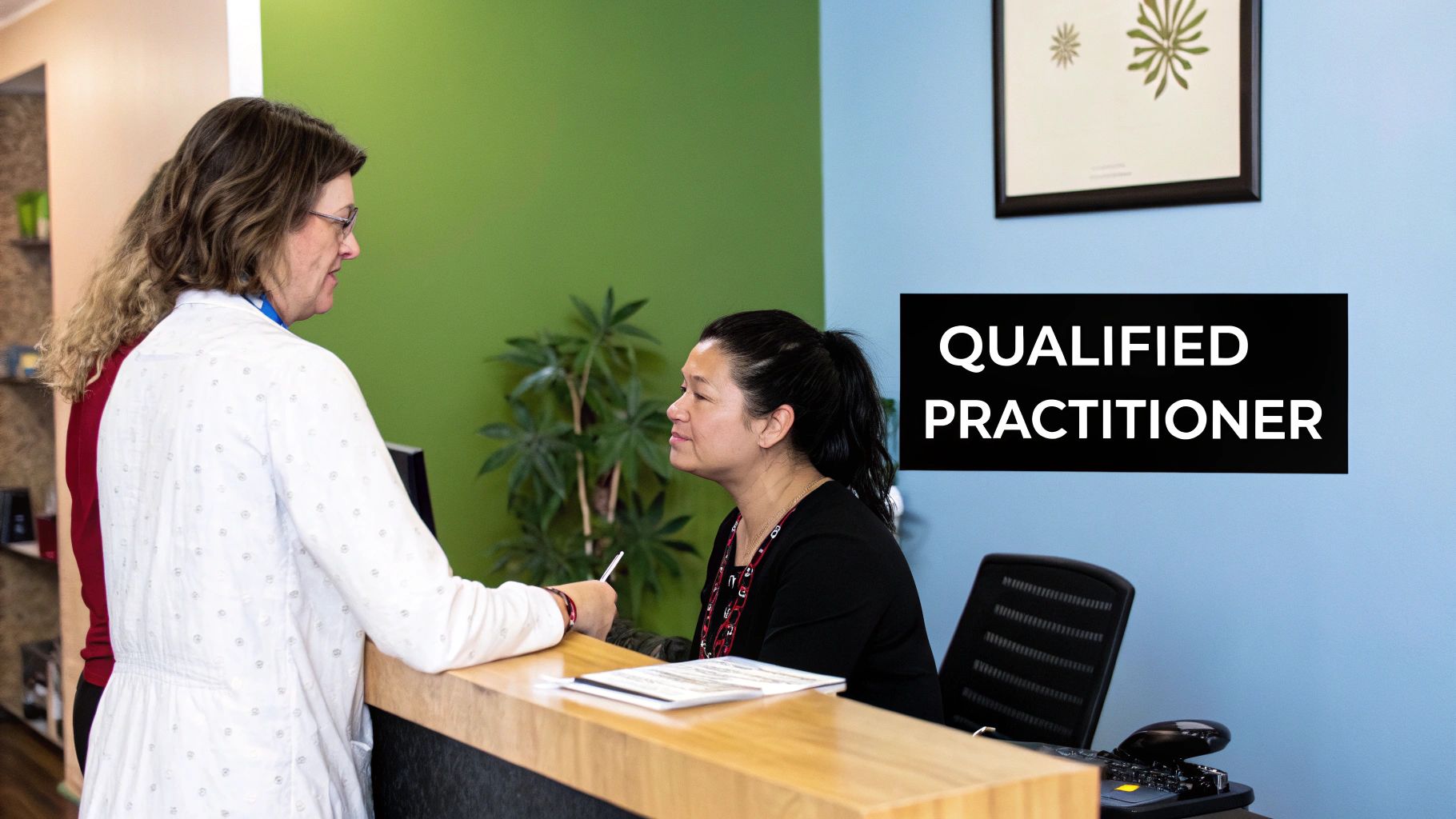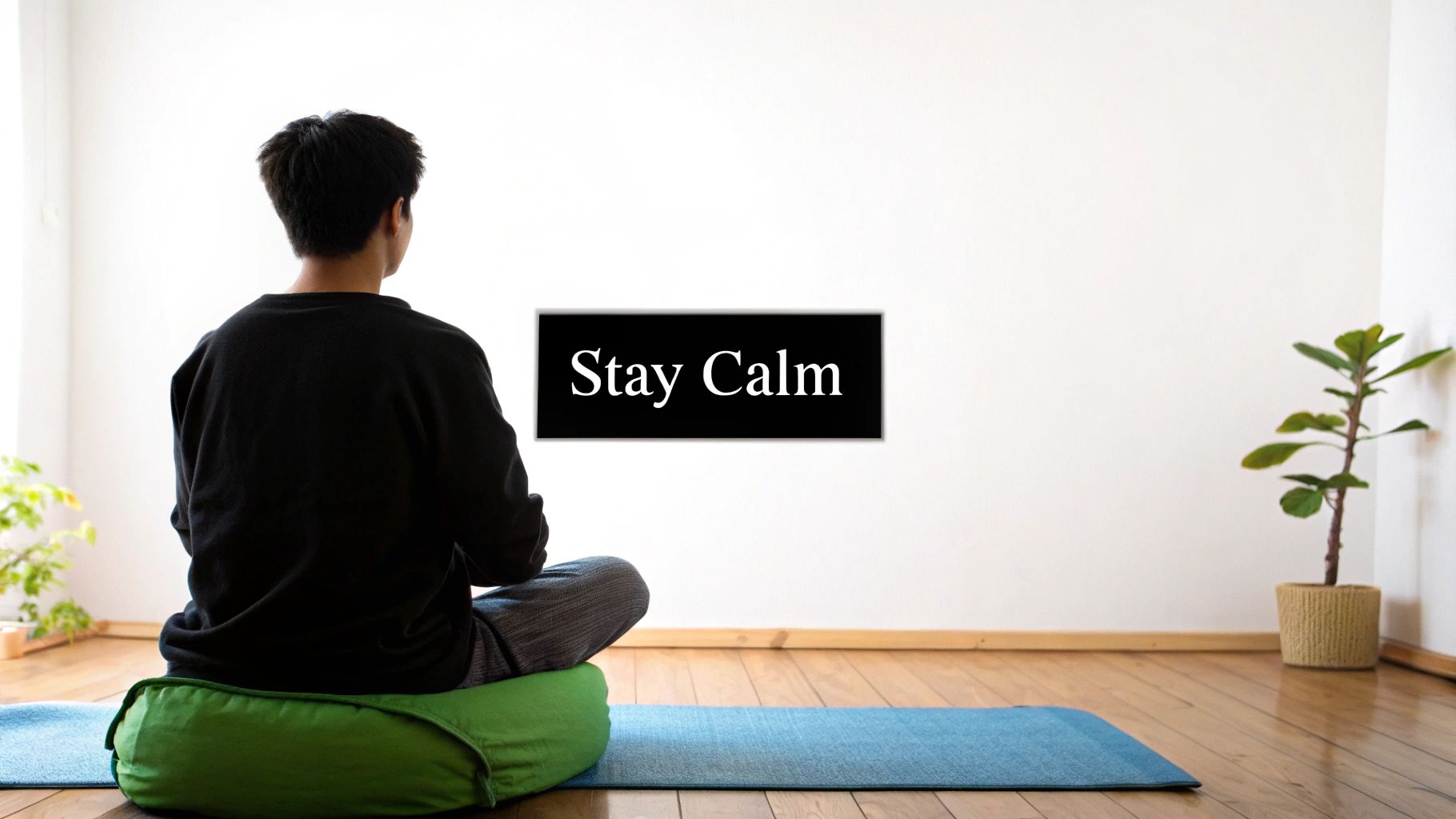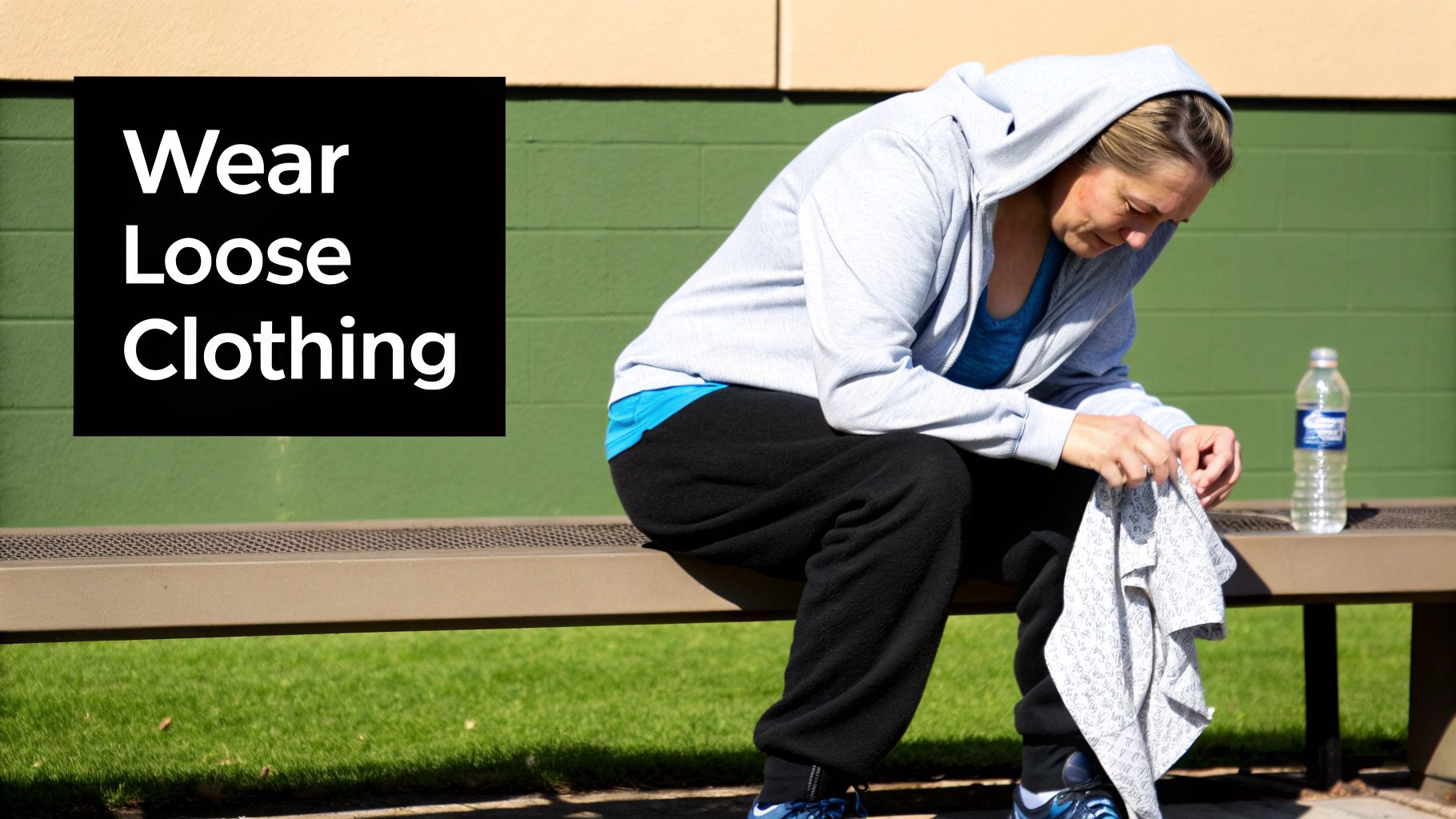Stepping into an acupuncture clinic for the first time can feel a bit mysterious, but trust me, a little preparation makes all the difference. To really get the most out of your treatment, there are a few simple things you can do—like having a light meal, wearing comfy clothes, skipping that afternoon coffee, and drinking plenty of water. It's not just about comfort; these small steps can genuinely enhance how effective the treatment is.
Your First Acupuncture Visit: What to Really Expect
Knowing what’s coming can turn any nervousness into genuine excitement. An acupuncture session isn't just about needles; it's a carefully structured process designed to understand you and help rebalance your body's energy, or Qi. Your first visit, in particular, is a deep dive into your health story and what you hope to achieve.
The Initial Chat: Getting to Know You
Your appointment will always start with a conversation. A good practitioner needs the full picture of your health, not just the one thing that prompted you to book. It's a true partnership.
Be ready to talk about:
- Your main concerns: Get specific. What does the pain feel like? When did it start? What makes it better or worse?
- Your health history: This covers everything from old injuries and surgeries to any ongoing conditions.
- Your lifestyle: We'll likely touch on your diet, sleep habits, stress levels, and even your emotional well-being.
- Your goals: What are you hoping for? Relief from chronic pain? Better sleep? A calmer mind?
This chat is everything. Your answers help us form a diagnosis from a Traditional Chinese Medicine (TCM) perspective. This often includes feeling your pulse and looking at your tongue—two classic TCM diagnostic tools that give us incredible insight into your internal health.
A Pro Tip: The more open and honest you can be during this initial talk, the better we can tailor the treatment to you. Think of your acupuncturist as a health detective; every detail you share is a valuable clue to solving the puzzle of your well-being.
What the Session Actually Feels Like
Once the diagnostic part is done and you're settled comfortably on the treatment table, it's time for the needles. Let's clear this up right away: these are not a doctor's hypodermic needles. They are sterile, single-use, and incredibly thin—many are as fine as a single strand of hair.
Most people feel very little, if anything, as the needles are placed. You might notice a dull ache, a slight tingle, or a feeling of warmth or heaviness around the needle. These sensations are completely normal and are actually a good sign—it means we’ve activated your body's Qi. For a more detailed breakdown of the experience, you can read more about what to expect during your first acupuncture treatment.
The process itself is quite straightforward.

As you can see, the focus is on restoring the flow of Qi. A typical session uses between 10–20 needles, and you'll rest with them in for about 30–60 minutes. Once the needles are in, we leave you to relax in a quiet, peaceful space. This is your time. Many of my patients drift into a deeply relaxed state, and some even fall asleep. It’s the perfect opportunity to let your body do its healing work.
Your Pre-Acupuncture Checklist
To make things even simpler, here's a quick checklist you can run through before your appointment. Following these small steps helps ensure you're comfortable, relaxed, and ready to receive the full benefits of the treatment.
| Preparation Step | Why It Matters for Your Session | Simple Action to Take |
|---|---|---|
| Eat a Light Meal | Prevents feeling lightheaded or dizzy during treatment. | Have a snack or small meal 1-2 hours before you arrive. |
| Wear Loose Clothing | Allows easy access to acupuncture points and keeps you comfortable. | Opt for shorts, sweats, or loose-fitting pants and tops. |
| Skip Coffee & Alcohol | These substances can alter your body's energy and interfere with diagnosis. | Avoid stimulants and alcohol for at least 4-6 hours beforehand. |
| Stay Hydrated | Good hydration supports energy flow (Qi) and helps your body respond. | Drink plenty of water throughout the day of your appointment. |
| Complete Paperwork | Saves time and lets you start your session in a calm state of mind. | Fill out any new patient forms online or arrive 10-15 minutes early. |
Running through this list before you head out the door is a simple habit that pays off. It ensures your mind and body are in the best possible state to benefit from the powerful, restorative effects of acupuncture.
Finding the Right Acupuncturist for You

A fantastic acupuncture experience doesn't just happen when you lie down on the treatment table. It actually starts much earlier, with the crucial step of choosing a practitioner you genuinely connect with and trust. Think of your acupuncturist as a partner in your health journey—finding the right one is fundamental to a successful outcome.
Sure, you can start with a quick online search, and patient reviews on Google or Yelp can offer some clues. But that's just scratching the surface. Your top priority should be verifying that the practitioner is properly qualified and licensed to practice in your state.
Decoding Credentials and Verifying Licenses
Professional credentials are not just a nice-to-have; they're essential. The most common designation you'll encounter is L.Ac., which stands for Licensed Acupuncturist. This title confirms the practitioner has met strict state-level requirements for both education and hands-on training.
Beyond state licensure, the national gold standard for certification in the United States comes from the National Certification Commission for Acupuncture and Oriental Medicine (NCCAOM). This tells you the practitioner has passed rigorous board exams and is committed to upholding the highest professional and ethical standards.
The good news is that the field has become increasingly professionalized as more people seek out acupuncture. Since its start in 1982, the NCCAOM has grown to include a registry of over 20,000 nationally certified practitioners. For a deeper dive, you can explore more data on the state of acupuncture in the United States to see how the profession has evolved.
Your acupuncturist's qualifications are the bedrock of your treatment. Always verify their license through your state's medical board website and check for NCCAOM certification. This simple step provides immense peace of mind.
Key Questions for Your Consultation
Once you have a shortlist of qualified practitioners, the next step is a consultation. This is your chance to get a feel for their personality, their approach to treatment, and whether their style meshes with your needs. It’s essentially an interview—and you’re the one doing the hiring for your personal wellness team.
Don't be shy about asking direct questions. Here are a few I always recommend:
- What is your treatment style? Different acupuncturists may specialize in various methods, like Traditional Chinese Medicine (TCM), Five Element, or specific Japanese styles.
- What's your experience with my specific condition? Whether you're dealing with chronic back pain, persistent migraines, or fertility challenges, you'll feel more confident with someone who has a track record of treating your concerns.
- What does a typical treatment plan look like? This helps you understand the expected frequency of visits and the general timeline for your care, which is great for managing expectations.
Pay close attention to how they answer. Do they take the time to explain concepts clearly? Do you feel like they are truly listening to you? An acupuncturist who is a great communicator and makes you feel comfortable is just as important as one with impeccable technical skills. That rapport is what turns a good treatment into a great healing experience.
What to Eat and Wear on Your Appointment Day

When you have an acupuncture appointment on the calendar, a few simple decisions about food and clothing can make a world of difference. These aren’t just small details; they genuinely influence how your body responds to the treatment and help you get the most out of your time on the table.
Showing up on a completely empty stomach is a common misstep. It can leave you feeling a bit lightheaded or woozy once the needles are in. On the flip side, coming in right after a heavy, greasy meal means your body is putting all its energy into digestion instead of healing.
The sweet spot? Aim for a light meal or snack about one to two hours before you head to the clinic. You’re just giving your body enough fuel to work with, not weighing it down. A small bowl of oatmeal, a handful of nuts with a piece of fruit, or a simple soup are all great choices.
Fueling Your Body for Treatment
Hydration is equally critical. In Chinese medicine, we talk about Qi (your body's vital energy), and it simply flows better when you're properly hydrated. But what you drink matters. I always advise patients to steer clear of caffeine and alcohol for at least a few hours leading up to their session.
These substances can throw your nervous system off balance and make it tricky for your practitioner to get an accurate pulse reading—a cornerstone of our diagnostic process. They can also alter how your body reacts to the needles. Your best bet is to stick with water or a calming herbal tea.
This kind of practical advice is increasingly backed by broader data. The International Acupuncture Case Registry, which started in 2017, collects real-world information that helps us refine our methods. This data reinforces what practitioners have known for years: simple prep like proper hydration and avoiding certain substances really does improve treatment outcomes. You can learn more about how clinical registries are shaping acupuncture best practices and why these small steps matter.
Dressing for Comfort and Access
Now, let's talk about what to wear. This is all about balancing your own comfort with the practitioner's need to access key acupuncture points.
Think loose, soft, and comfortable.
- Tops: A simple t-shirt or a loose long-sleeve shirt is perfect.
- Bottoms: Yoga pants, joggers, wide-leg trousers, or even shorts are all excellent choices.
- Fabrics: Lean toward soft, breathable materials like cotton or bamboo.
This is purely functional. Many of the most powerful acupuncture points are on the forearms, lower legs, abdomen, and back. If you wear clothing that can be easily pushed or rolled up, you probably won't need to change into a gown. It just makes the whole process feel smoother and more comfortable.
Key Takeaway: Your clothing choice directly contributes to a successful session. Dressing in layers is also a smart strategy, as your body temperature can fluctuate during treatment. Comfort is paramount.
By being mindful of what you eat, drink, and wear, you're doing more than just showing up for an appointment. You're actively participating in your own healing, creating the best possible conditions for your body to rebalance itself.
How to Mentally Prepare for Your Session

Acupuncture isn't just a physical treatment; your state of mind coming into a session can genuinely influence how well your body responds. Think of it this way: your mind and body are in constant conversation. By preparing mentally, you're setting the stage for a much more productive and healing dialogue.
The best thing you can do, especially if you're new to acupuncture, is to simply show up with an open mind. It's completely normal to feel a mix of curiosity and maybe even a little skepticism. My advice? Try to leave those expectations at the door and just be present for the experience. Let your body have the final say.
Set Realistic Expectations
This is a big one. I often see new patients who hope for a one-and-done miracle cure. While some people do feel a dramatic shift after just one session, that's more the exception than the rule. True, lasting healing is almost always a process.
I like to use the analogy of tending a garden. You plant a seed, you water it, you give it sun, and you trust that over time, it will grow. Acupuncture works in a similar way. Each session is another step on your wellness journey, building on the progress of the last one. Patience is your best friend here.
Key Takeaway: Your mindset is a powerful tool. Arriving calm, open, and with realistic expectations creates the ideal internal environment for your body to heal and rebalance. Trust the process and give it the time it needs to work.
Arrive Calm and Ready to Receive
Ever notice how your body feels after rushing from a high-stress meeting? Tense, tight, and buzzing with adrenaline. Bringing that energy into the treatment room can make it harder for your body to relax and receive the full benefits of the session.
If you can, give yourself a small buffer of 10-15 minutes before your appointment. Don't spend it scrolling on your phone. Instead, just sit quietly in the waiting area. It's a perfect opportunity to disconnect and center yourself.
Here's a simple breathing technique I recommend to my patients, which you can do anywhere:
- Inhale slowly through your nose for a count of four.
- Hold your breath for a count of four.
- Exhale slowly through your mouth for a count of four.
- Pause for a count of four before the next breath.
Just a few rounds of this "box breathing" can work wonders to quiet your nervous system. It sends a signal to your body that it's safe to relax. Since acupuncture is an excellent tool for stress management itself, this pre-session ritual can create a wonderful positive feedback loop.
Lastly, take a moment to check in with yourself. How are you really feeling today, both physically and emotionally? Having that clarity ready helps you communicate your needs effectively, allowing your practitioner to design the most targeted and beneficial treatment for you.
What to Do After Your Acupuncture Treatment
The benefits of your acupuncture session don't just stop when you walk out the door. Think of the treatment as planting a seed; how you tend to yourself in the hours and days that follow will determine how well it grows. This aftercare is your chance to really amplify and extend the healing process.
Your body has just been guided toward a more balanced state. The most helpful thing you can do now is to simply allow it the time and space to integrate these changes. My best advice is to plan for a low-key rest of your day. This isn't about being bedridden, but it does mean putting off that intense spin class, a stressful work deadline, or heavy lifting until tomorrow.
Jumping right back into a high-intensity activity or a high-pressure environment can jolt your system, potentially undoing some of the calming, restorative work we just did. A gentle walk is wonderful, but anything that feels like a major push should wait.
Nurturing Your Body Post-Treatment
Just as it was important before your session, hydration is key afterward. Keeping up with your water intake helps support your body's natural detoxification processes and encourages the smooth flow of energy, or Qi, that the treatment helped to regulate.
I also recommend holding off on alcohol and steering clear of excessive caffeine for the rest of the day. These can interfere with the energetic rebalancing your body is experiencing. Instead, focus on whole, nourishing foods and maybe a soothing herbal tea to support the healing from the inside out.
The importance of this aftercare is echoed by the global embrace of acupuncture. The therapy is now practiced in 183 countries, and its effectiveness is backed by over 13,000 studies worldwide. This growing body of global research and endorsement of acupuncture confirms that the treatment is a process, not a one-off event, and your post-session care is a crucial part of getting the best results.
Observing Your Body’s Response
One of the most powerful things you can do is pay close attention to how you feel. Become a gentle observer of your own experience. How do you feel right after leaving the clinic? What about a few hours later, or the next morning?
Your post-treatment experience is uniquely yours. Some people feel deeply relaxed and peaceful, while others get a welcome burst of energy. Both are perfectly normal and are great signs that your body is responding to the treatment.
Take note of any shifts, no matter how subtle they seem.
- Has your pain level changed?
- Do you feel a bit lighter emotionally?
- Did you sleep better that night?
- Have you noticed any changes in your digestion or overall energy?
Keeping a small log of these observations—even just a quick note on your phone—is incredibly helpful. When you share this feedback with your practitioner at your next visit, you give them a roadmap to refine your treatment plan. This ensures your care is always tailored to what your body needs at that moment, creating a powerful partnership for your long-term health.
Answering Your Top Questions About Acupuncture Prep
Even with the best preparation guides, it's natural for a few more specific questions to pop up as your appointment gets closer. I get it. Thinking through these last-minute details can make all the difference in feeling truly comfortable and ready for your session.
Let's dive into some of the questions I hear most often from patients.
How Long Before My Appointment Should I Eat?
This is a great, practical question. The sweet spot is to have a light snack or a small meal about one to two hours before you come in.
Showing up on a completely empty stomach isn't ideal—it can sometimes leave you feeling a bit lightheaded or woozy during the treatment. On the flip side, eating a big, heavy meal right before your session forces your body to focus all its energy on digestion, which can get in the way of the treatment's full effect.
Think of it as finding the perfect balance. A piece of fruit, a small handful of nuts, or a cup of soup is just enough to stabilize your system without making it work overtime.
Can I Get Acupuncture During My Period?
Absolutely! Not only is it safe, but it can be incredibly helpful.
Many women schedule their appointments specifically during their cycle because acupuncture can be fantastic for easing common issues like menstrual cramps, bloating, and even the mood swings that can tag along.
Just be sure to let your practitioner know. This piece of information is key, as it allows us to choose specific points that support your body's unique needs during this phase.
What if I'm Scared of Needles?
You are not alone—this is probably the most common concern I hear. When people think of needles, they're usually picturing the kind used for shots or blood draws.
Let me put your mind at ease. Acupuncture needles are in a completely different league. They are incredibly thin—about the width of a human hair—solid, and flexible. You could fit several of them inside the tip of a standard hypodermic needle.
Most patients feel very little. You might feel a tiny pinch as the needle is placed, or perhaps a dull, gentle sensation, which is actually a good sign that the treatment is starting to work. An experienced practitioner knows how to make the experience comfortable. We can use fewer needles, choose gentler points, and guide you through the entire process. Your comfort is always the first priority.
Key Insight: The feeling of an acupuncture needle is nothing like getting a shot. Always voice your fears to your practitioner. A good one will adjust their approach to make sure you feel safe and relaxed.
Should I Stop My Medications Before Treatment?
No, you should never stop or change the dose of any medication without talking to the doctor who prescribed it first. It's vital to stick to your regular medication schedule exactly as your physician has instructed.
That said, it's just as important to tell your acupuncturist about everything you're taking. This includes all prescriptions, over-the-counter drugs, vitamins, and even herbal supplements. Giving us the full picture helps us create a safe, effective treatment plan that complements your existing healthcare. This also connects to the financial side of things; you can learn more about whether health insurance covers acupuncture and how your policy may play a role in your overall care.
At Eric Tsai Acupuncture and Herbs, we believe in looking at your complete health profile to provide truly integrated care. By understanding all the factors at play, we can create a personalized plan to restore your balance and promote lasting wellness. Book your appointment today and take the first step toward relief and renewed energy.

